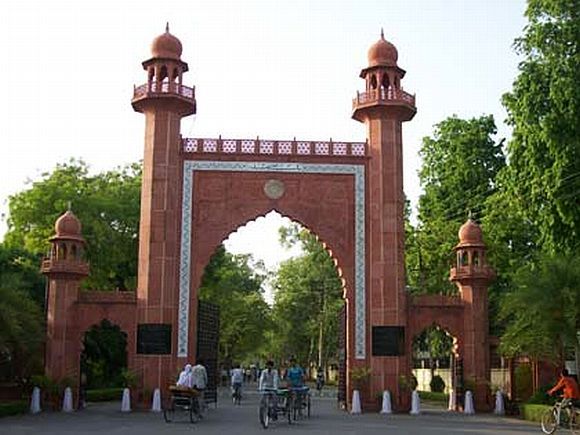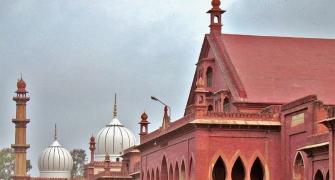 The National Democratic Alliance government on Monday told the Supreme Court that it would withdraw the appeal filed by the erstwhile United Progressive Alliance government challenging the Allahabad high court verdict holding the Aligarh Muslim University as non-minority institution.
The National Democratic Alliance government on Monday told the Supreme Court that it would withdraw the appeal filed by the erstwhile United Progressive Alliance government challenging the Allahabad high court verdict holding the Aligarh Muslim University as non-minority institution.
"I changed my mind two months ago," Attorney General Mukul Rohatgi told a three-judge bench headed by Justice J S Kehar about the Centre's decision to withdraw the appeal and distance itself from AMU, which has sought to counter it.
"I am distancing myself from the AMU," he further told the bench, also comprising Justices M B Lokur and C Nagappan.
He submitted that as the AMU was set up by the central Act and in 1967 a five-judge Constitution bench of the apex court had in Aziz Basha judgement held it as a "central universitry" and not a minority institution.
Rohatgi said 20 years later, an amendment was brought in 1981 to accord the university minority status which was held as unconstitutional by the high court.
"You cannot override the Aziz Basha judgement. Union of India's stand is that according minority status to AMU would be contrary to the Aziz Basha judgement and it still holds good," the top law officer told the bench which permitted the Centre to file an application along with an affidavit within eight weeks to withdraw the appeal filed by it.
The bench said the AMU, which was represented by senior advocate P P Rao, thereafter, can file the counter-affidavit to the Centre's stand and posted the matter for hearing after the summer vacation.
The apex court also allowed some intervenors, for whom senior advocate Salman Khurshid appeared, to assist in the matter.
The high court had in January 2006 struck down the provision of the AMU (Amendment) Act, 1981 by which the university was accorded a minority status.
The division bench of the high court had upheld the decision of its single judge passed in 2005 by which it termed as "unconstitutional" the granting of minority status to AMU and 50 per cent reservation to Muslims in 2004.
The issue of AMU's minority status had cropped up before another bench headed by Chief Justice T S Thakur which was hearing a separate matter relating to the challenge of appointment of its Vice Chancellor Lt General (retd) Zameeruddin Shah.
"Can a university itself be termed as a minority institution," the bench, also comprising Justice U U Lalit, asked during the hearing. The matter had come in the pre-lunch session and the attorney general, who was present in the courtroom, said that the "Union of India is not inclined to proceed with its appeal against the high court judgement before another bench."
Khurshid, who was also present, said the decision of another bench on the issue of minority institution will have a bearing on the vice chancellor matter as well.
Senior advocate Kapil Sibal, who was present in the courtroom, said the present VC was appointed during his tenure as the Union minister for human resource development.
The attorney general had, on January 11, also made a statement in the apex court that the AMU could not be categorised as a minority institution.
"It is the stand of the Union of India that AMU is not a minority university. As the executive government at the Centre, we can't be seen as setting up a minority institution in a secular state," he had submitted, adding that "the previous stand (of the UPA government) was wrong."
He had said the law laid down in Azeez Basha case by a five-judge bench of the SC on October 20, 1967 still holds ground.
The AMU Act was enacted in 1920 dissolving and incorporating Mohammedan Anglo-Oriental College.
The AMU (Amendment) Act in 1951 was passed by Parliament to do away with compulsory instruction in Muslim theology. The amendment opened membership of the Court of AMU to non-Muslims.
Changes were introduced by the 1966 amendment to the AMU Act, which was challenged before the Supreme Court by S Azeez Basha. The SC dismissed the petition in 1967 holding that AMU was not a minority institution because it had been established by an Act of Parliament and had not been set up by Muslims.
Another amendment to AMU Act in 1972 made the academic and executive councils more democratic and drastically reduced the nominees of the Visitor.









